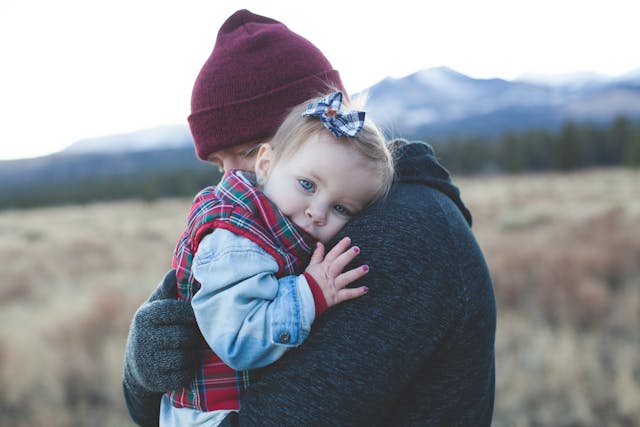
Children often feel the brunt of their parents’ divorce, facing an array of emotional, behavioral, and psychological changes.
According to the American Psychological Association, 40-50% of marriages in the U.S. end in divorce, affecting over 1 million children each year (APA Journal).
While the effects of divorce vary depending on the child’s age, personality, and the situation, the emotional and psychological consequences are typically profound.
This blog explores the various ways divorce can affect children and how parents can mitigate its negative impact.
Emotional Impact
Children facing their parents’ divorce often experience intense emotions that can feel overwhelming.
These feelings can vary widely based on the child’s age, personality, and the circumstances surrounding the divorce.
Feelings of sadness, anger, and confusion
Divorce brings significant changes to a child’s life, and many feel sad about losing the family they once knew.
It’s common for children to express anger towards their parents, thinking the situation is unfair or feeling like they are being punished.
Confusion can also arise, especially if parents don’t clearly explain what is happening.
Fear of abandonment and rejection
Children may also develop fears of being abandoned by one or both parents.
If one parent moves out, a child might feel rejected or worry that the other parent will leave them as well.
This fear can be very distressing and affect their sense of security.
Difficulty adjusting to a new living situation
Adjusting to a new living situation can be tough for children.
Whether they are moving between two homes or coping with a parent’s absence, they may struggle to adapt.
Changes in routines, rules, and possibly even new family members can lead to stress and anxiety.
Guilt and blame
Some children may wrongly blame themselves for their parents’ separation.
They might believe that their actions caused the divorce or that they could have done something to prevent it.
This sense of guilt can be heavy and challenging to overcome.

Behavioral Changes
The emotional stress of divorce often leads to noticeable changes in a child’s behavior.
How children react can vary widely—some may act out, while others withdraw, depending on how they cope with their feelings.
Acting out (aggression and defiance)
Some children deal with their frustration by acting out.
This can show up as aggressive behavior or defiance.
They might have more arguments with adults, ignore rules, or throw temper tantrums more often than they did before the divorce.
These behaviors are often a way for children to express their feelings of anger and confusion.
Withdrawal and isolation
In contrast, other children may internalize their emotions, becoming withdrawn or isolated.
They might pull away from social interactions, avoiding friends and family members.
Activities that they once enjoyed may no longer interest them, and they may spend more time alone, which can be a sign of emotional distress.
Academic difficulties
The impact of divorce can also show up in the classroom.
Many children find it harder to focus on schoolwork, leading to a drop in grades.
Studies have found that children of divorced parents are more likely to face academic challenges, especially in the first few years after the separation.
Difficulty concentrating, stress, and emotional distractions all contribute to these setbacks.
Changes in eating or sleeping habits
Divorce can disrupt a child’s daily routine, affecting how they eat and sleep.
Some children might turn to food for comfort, overeating as a way to cope with their emotions.
Others may lose their appetite altogether.
Sleep issues are also common, with children experiencing trouble falling asleep, waking up frequently, or having nightmares.

Long-Term Effects
The impact of divorce can last well into adulthood, influencing a child’s mental health, relationships, and overall quality of life.
Increased risk of mental health issues
Children of divorced parents are more likely to face mental health challenges as they grow older.
They are at a higher risk for developing conditions like anxiety and depression.
Research shows that these children are about 20% more likely to experience mental health disorders later in life compared to those from intact families.
The emotional stress from divorce can carry forward, making it harder to cope with life’s ups and downs.
Difficulty building healthy relationships
Many children who go through a divorce find it harder to form stable, healthy relationships as adults.
They may have trust issues, be afraid of commitment, or struggle with communication in their romantic relationships.
These challenges can stem from their experiences during their parents’ separation and their view of relationships.
Risk of substance abuse
Studies have shown a link between parental divorce and a higher risk of substance abuse.
Children from divorced families are more likely to turn to alcohol or drugs as a way to cope with their emotions, especially during their teenage years or later in life.
The emotional turmoil of divorce can sometimes push children toward unhealthy coping mechanisms.
Financial challenges
Divorce often brings financial strain, which can affect a child’s quality of life.
Single-parent households may have fewer resources, leading to limitations in areas like extracurricular activities, educational opportunities, or even basic needs.
This financial instability can have a lasting impact on a child’s well-being and future opportunities.

Factors Affecting Children’s Experiences
While divorce can have negative effects on children, several factors play a role in shaping how a child handles and processes the experience.
Age of the child
The age of the child at the time of divorce is crucial in determining their reaction.
Younger children may not fully understand what’s happening, but they are more likely to feel abandoned or insecure.
They might cling to one parent or become anxious.
Teenagers, on the other hand, are more likely to respond with anger or rebellion as they try to make sense of the changes in their family.
Quality of the relationship between parents
One of the biggest influences on a child’s well-being after a divorce is the relationship between the parents.
If parents can maintain a healthy, cooperative co-parenting relationship, children tend to adjust better.
On the other hand, when there’s ongoing conflict, children often experience more emotional distress and may develop behavioral problems.
A peaceful, respectful relationship between parents can go a long way in easing the child’s adjustment.
Parental involvement and support
Consistent involvement from both parents is key to helping children cope with divorce.
When children feel supported, loved, and know that both parents are still there for them, it provides much-needed stability.
Regular communication and spending quality time with both parents can make the transition easier and help children feel secure despite the changes.
Child’s personality and coping skills
Every child is different. Some children are naturally more resilient and able to cope with stress better than others.
These children might adjust to the divorce more quickly.
Others may need extra support to manage their emotions and navigate the changes.
Understanding each child’s unique personality and providing the right level of emotional support can make a significant difference.

Mitigating the Negative Impacts
Divorce can be challenging for children, but there are several steps parents can take to help minimize its negative effects.
Open and honest communication
It’s important for children to understand what’s happening during a divorce in a way that’s appropriate for their age.
Being open and honest can help reduce their confusion and fears, allowing them to process the situation more effectively.
Clear explanations can help children feel more secure and informed.
Providing emotional support and reassurance
Children need to know that they are loved and that the divorce is not their fault.
Parents can offer consistent emotional support by listening to their concerns and validating their feelings.
Reassuring them regularly can help them feel secure during this uncertain time.
Encouraging healthy coping mechanisms
Teaching children healthy ways to cope with their emotions is crucial.
Encourage them to talk about their feelings or engage in creative activities like drawing or writing.
These outlets can help them express their emotions in a productive way, making it easier for them to manage their feelings.
Seeking professional help if needed
If a child is having a hard time coping with the divorce, seeking help from a therapist or counselor can be very beneficial.
A professional can provide valuable tools and strategies for managing stress and emotions, helping the child navigate this difficult time.
Maintaining a positive co-parenting relationship
Parents should strive to work together in a supportive and cooperative manner, minimizing conflict in front of the children.
When parents can maintain a stable, loving environment in both homes, it helps ease the transition for kids and provides them with a sense of security.
Final Thoughts
Divorce is a major event in a child’s life, and it can deeply affect their emotions, behavior, and overall well-being.
While it can be a difficult time, parents who offer strong support, keep communication open, and focus on their children’s needs can help them get through it with resilience and strength.


